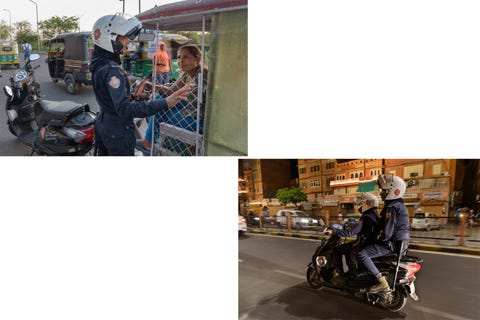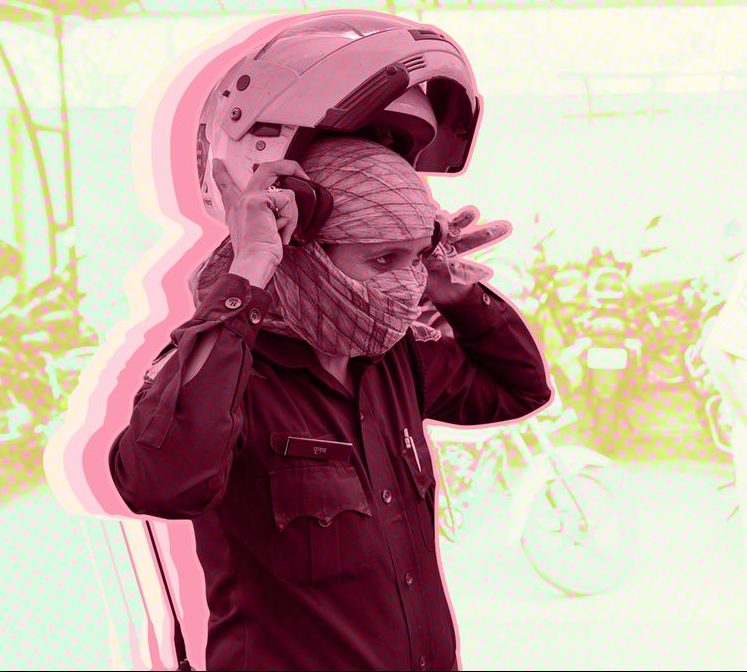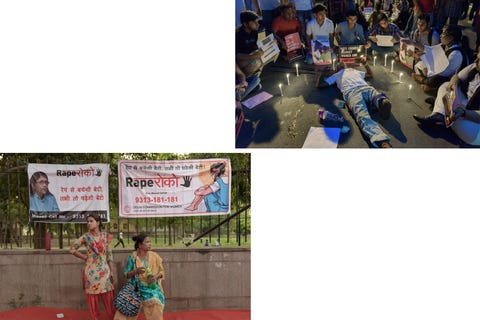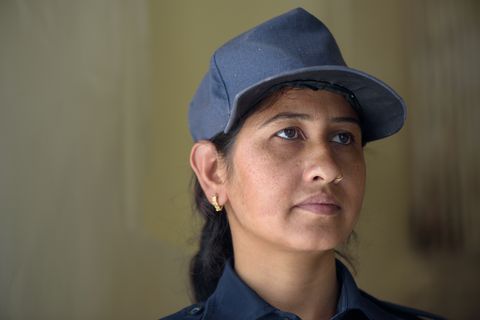Once Nirmala notices him, she springs into action. Sat on the wall outside a busy shopping mall in Jaipur, north India, he looks so ordinary: rucksack slung over one shoulder, a pair of office-ready grey trousers. But now panic begins to wash over his face. Joined by three fellow policewoman, Nirmala closes in.
‘Does she look like a child to you?’ asks Nirmala, anger bubbling up in her voice.
Another officer, Premlata, takes the man by his arm and escorts him to Gaurav Tower police station, just across the road. The room is small – only a bed, a fan and a small desk fit inside. The shutters are wide open but the window is barricaded with metal bars.
He tries to apologise, but it’s too late.
‘When you harass a girl, do you realise how much it disturbs her mind?’ questions Nirmala.
In any other circumstance, this man might have walked free. He appeared silently behind a woman, tapped her on the shoulder and offered her a balloon. He badgered her, wouldn’t leave her alone, but nothing that bad happened, right? It’s better to avoid making a scene, right?
Not today. And not with Jaipur’s all-female police squad on duty.
‘It doesn’t matter – if you’re troubling women, then you’re doing something wrong,’ says Premlata. ‘If we take a step the first time something happens, such incidents won’t happen again.’

Jhooma, 29, and Premlata, 35, during their patrolling duty in Jaipur.
She and Nirmala are two of 52 policewomen who patrol the streets protecting women, preventing crimes like harassment (known colloquially as ‘eve-teasing’), rape, molestation and assault. No matter how big or small, every such crime against women is taken seriously.
But they’re not only an all-female squad: these women are mounted bikers. In pairs, they zig-zag across the city on motorbikes, interrupting crime when they see it taking place.
‘We’re on the road in direct touch with the women – and we can take direct action for them,’ explains Nirmala. ‘The cases we register are handled by the police station no matter what. So the power is in our hands. If you’ve harassed a women in anyway, you will be arrested.’

Nirmala Lakhera, 42, at her home in Jaipur.
A woman is raped in India every 13 minutes. In 2016, six women were gang-raped every day; a bride was murdered for dowry every 69 minutes.
Five years after the infamous Delhi-gang rape, in which 23-year-old Jyoti Singh died after being attacked by six men on a bus, women say India is clearly still unsafe. Read any newspaper or website and it’s a heartbreakingly endless stream of abuse – stories pour out with shocking fervour, the latest ‘brutal’ rape dissected and discussed so much the violence becomes almost normalised.
In recent months, a series of cases shocked the country once again. From the rape, torture and murder of an eight-year-old girl in the state of Jammu to two teenage girls who were raped then set on fire in Jharkhand – the issue of sexual violence is firmly back on the national agenda.
As with the events six years ago, the attacks have given rise to protests . In April, thousands of people took to the streets all over India and prompted demands for stricter rape laws.





